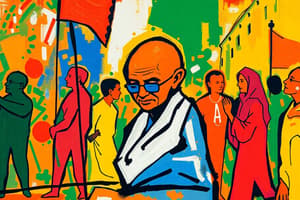Podcast
Questions and Answers
What is the meaning of Satyagraha?
What is the meaning of Satyagraha?
- Unity through mass protests
- Nonviolent civil disobedience rooted in truth and moral authority (correct)
- Supporting colonial rule
- Violent resistance against oppression
Where did Mahatma Gandhi first implement Satyagraha?
Where did Mahatma Gandhi first implement Satyagraha?
- Natal Province against Indian immigrants
- Quit India Movement against the British
- India during the Salt March
- South Africa against British colonial rule (correct)
In Gandhi's philosophy, how is truth attained?
In Gandhi's philosophy, how is truth attained?
- By dishonesty and deception
- By nonviolent methods and striving for honesty and integrity (correct)
- By coercion and force
- Through violent means
How did Gandhi use Satyagraha in his fight against British colonial rule?
How did Gandhi use Satyagraha in his fight against British colonial rule?
What was the central tenet of Satyagraha according to Gandhi?
What was the central tenet of Satyagraha according to Gandhi?
What key element allowed Satyagraha to transform the Indian National Movement into a mass movement?
What key element allowed Satyagraha to transform the Indian National Movement into a mass movement?
Which movements around the world were inspired by Gandhi's techniques of nonviolent resistance?
Which movements around the world were inspired by Gandhi's techniques of nonviolent resistance?
What impact did Satyagraha have on Indian politics and society?
What impact did Satyagraha have on Indian politics and society?
Which principle was NOT a part of Satyagraha as mentioned in the text?
Which principle was NOT a part of Satyagraha as mentioned in the text?
Why is Satyagraha considered a potent force for social change in contemporary Indian politics?
Why is Satyagraha considered a potent force for social change in contemporary Indian politics?
Study Notes
Mahatma Gandhi and the Indian National Movement: A Deep Dive into Satyagraha
Mahatma Gandhi, the iconic figure of India's freedom struggle, is renowned for his philosophy of Satyagraha, a concept that not only shaped his nonviolent approach to civil disobedience but also served as the backbone of the Indian National Movement. Satyagraha, which means "truth-force," is rooted in the principles of nonviolence, civil resistance, and moral authority.
The Origins of Satyagraha
The origin of Satyagraha can be traced back to South Africa in the late 19th century, where Gandhi resided as a lawyer. During this period, Gandhi encountered the injustices and discriminatory laws faced by Indian immigrants, particularly in the Natal Province. His response was to organize nonviolent mass protests, seeking redress of their grievances against the British colonial government.
The Principles of Satyagraha
Satyagraha is built upon numerous principles, including truth, nonviolence, noncooperation, and resistance. Gandhi's central tenet was that the truth can be attained through nonviolent means, and the individual must strive for a life of honesty and integrity.
Satyagraha in Action
Gandhi employed Satyagraha in various forms during his campaigns for Indian independence, such as the Salt March (1930) and the Quit India Movement (1942). In these instances, he led massive nonviolent movements that aimed to challenge colonial rule and inspire the masses to unite in their pursuit of freedom.
The Legacy of Satyagraha
The success of Satyagraha lies in its ability to transform the Indian National Movement into a mass movement that mobilized millions of people. Gandhi's techniques of nonviolent resistance inspired movements throughout the world, including the Civil Rights Movement in the United States and the Anti-Apartheid struggle in South Africa.
Satyagraha's Impact on India
Satyagraha not only freed India from British rule but also paved the way for a new, egalitarian democracy. Gandhi's emphasis on nonviolence and civil resistance has left a lasting impact on Indian politics and society. The principles of Satyagraha continue to be relevant in contemporary Indian politics and remain a potent force for social change.
In conclusion, Mahatma Gandhi's philosophy of Satyagraha has profoundly shaped India's freedom struggle and continues to inspire people throughout the world. Through nonviolent means, Gandhi was able to challenge colonial rule and inspire the Indian masses to join him in his pursuit of freedom. Satyagraha's principles of truth, nonviolence, noncooperation, and resistance serve as a powerful example of how individuals can change the course of history.
Studying That Suits You
Use AI to generate personalized quizzes and flashcards to suit your learning preferences.
Description
Test your knowledge on Mahatma Gandhi's philosophy of Satyagraha and its impact on the Indian National Movement. Explore the origins, principles, and legacy of Satyagraha in shaping India's freedom struggle.




